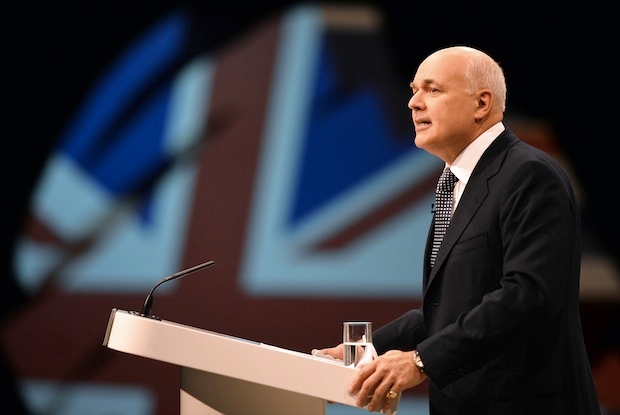Iain Duncan Smith’s speech today setting out the moral mission behind his welfare reforms (his series of interventions doing this was previewed in the Spectator at the start of this year) has attracted the usual criticism from Labour for having ‘nothing to say about the cost-of-living crisis’ and a programme ‘in complete disarray’.
The opposition has a point about the delivery of the reforms and the detail in some cases – it would be a fib to say Universal Credit has enjoyed a smooth ride, although some of its most nervous critics in government currently seem a little more optimistic – but what Labour does struggle to do is give any sense of a distinctive overall reform programme. That’s because it still supports Universal Credit in principle and accepts that it should have made greater efforts to reform welfare when in office. Even those who criticise the detail of the reforms accept that stasis is not an option. For example, while I’ve written about the problems with the design and delivery of the Work Capability Assessment, there is little to commend what came before these tests, which was Incapacity Benefit claimants receiving very little if any monitoring of their conditions.
What’s interesting about the overall principle of the welfare reforms is that politicians in other countries are now taking an interest in replicating them. Duncan Smith visited the US in September 2013 for meetings with Ted Cruz, Mike Lee, Paul Ryan and Todd Young about Universal Credit. The reforms in this country were based on the Wisconsin welfare reforms, but now Republicans are interested in using UC as a model for taking their own reforms further. Ryan praised the British welfare reforms in this interview in January (although he too described UC as having had ‘some hiccups and rough patches in implementing it’). Former Wisconsin Governor Tommy Thompson, who has shared a platform with IDS on this issue, says the Work and Pensions Secretary ‘is showing policymakers the way to overhaul and reform a welfare reform system badly in need of modernisation… The results of what he is doing in Britain are an example to reformers worldwide – and of what we can achieve if we adopt his comprehensive, resolute and successful strategy’.
Duncan Smith also briefed a group of state workforce secretaries on the Work Capability Assessment and Incapacity Benefit to help with their advice on US disability benefits reform for Republicans on the Ways and Means Committee. DWP officials have also visited the US to help with this work in particular, and the executive director of the group also visited London.
Now, doubtless IDS’ critics will scoff at this, saying that only the Republicans would want to emulate reforms that have had such a bumpy ride and which have seen the provider of fitness-to-work tests exit its contract early. But that then returns us to the Labour party, who do not oppose the substance of the reforms, beyond a commitment to repeal the ‘bedroom tax’ and to cut overall welfare spending in a ‘fairer’ way. They did appoint Atos to carry out the Work Capability Assessments, although latterly called for the company to be sacked from the contract, which the government rolled out from pilots to the whole cohort of Incapacity Benefit claimants. They also know that there is little to be gained with the electorate in reversing the popular welfare reforms.
It’s not only the Republicans, who after all do not enjoy automatic acceptance among the Tories in this country, who want to replicate Duncan Smith’s welfare reforms. In the end, unless something dramatic changes in Labour policy between now and 2015, it’s the Opposition too.







Comments